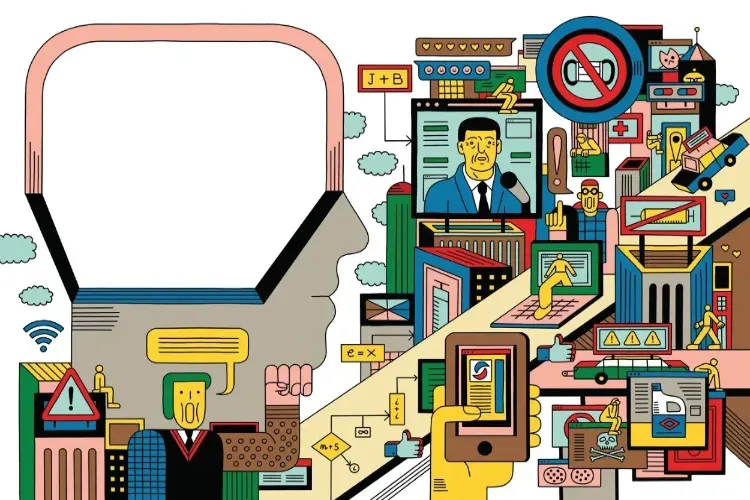
Saquib Salim
Switch on a TV channel, open a newspaper, or log on to a news portal or social media platform; you will find negativity dominating the narratives. People generally complain that only negative news with sensationalism is being catered to.
Marc Trussler, University of Pennsylvania, and Stuart Soroka, University of California, in one of their research found out that even though people say that they “want less negative, less strategic stories”, in reality, they “are more likely to select negative content”.
Why do people prefer negative news?
Psychologists, evolutionary biologists, and anthropologists believe that during evolution organisms in general, and humans in particular, developed a mechanism of identifying threats to defend themselves against dangers. Our brains are hardwired to look for negative, or dangerous news.
Well know psychologists, Roy F. Baumeister and Ellen Bratslavsky, argue, “it is evolutionarily adaptive for bad to be stronger than good. We believe that throughout our evolutionary history, organisms that were better attuned to bad things would have been more likely to survive threats and, consequently, would have increased probability of passing along their genes.”
Guido Peeters, a prominent psychology scholar, believes that “because negative events are much rarer than positive events, it is adaptive to assume the positive (the most likely occurrence) while being watchful for the dangerous negative.” A rarer event is natural to make headlines while commonplace occurrences cannot be called ‘news’.
Famous scholars, Paul Rozin and Edward Rozyman write, “negative information seems to command more attention”. In a study, they found “minimal but provocative evidence that negative events grow more rapidly in negativity as they are approached in space or time than do positive events”.
Scholars know this inclination towards bad news or information as a negativity bias. It is believed that “in most situations, negative events are more salient, potent, dominant in combinations, and generally efficacious than positive events”. It is also believed that “given inverse negative and positive events of equal objective magnitude, the negative event is subjectively more potent and of higher salience than its positive counterpart”.
Why do the media sell negative news?
One question which arises is if we humans are rational beings with high intellect and understand the nuisances of news selection then why don’t we control our behaviour.
The problem is about credibility. Toni G.L.A. van der Meer and Anna Brosius, scholars of Communication Sciences, in their 2022 study, found out that “when the same objective information is formulated negatively rather than positively, this formally equivalent news is more likely to be evaluated as more credible”. They also concluded that people who read more newspapers or spend more time-consuming news are no less prone to negativity bias.
Baumister and Bratslavsky also argue, “bad news sells more papers”. The market relationship of negativity bias was also pointed out by literary critic, Leslie Fiedler, that “no one has ever been able to make a successful novel about a happy marriage, whereas marital problems have filled countless novels”.
Another problem is that media outfits need money to survive. Like any other product news also needs a market. Several scholars have argued that media houses, especially under the onslaught of the internet and social media where the consumer can choose the news they want to consume, are focussing more on news items that are economically more viable. Journalistic considerations and integrity often take a back seat.
Are we doomed?
Can we come out of this negativity bias? Margret W. Matin and David J. Stang, in their book The Pollyanna Principle, documented a number of positive biases among humans. They showed that humans also want to hear good news. Inferior Frontal Gyrus (IFG) region in our brain, has the function of selectively filtering bad news. It has been shown that increased activity of IFG leads to optimism and hence better physical and mental health.
Meer and Brosius, found out in their study that even though people consider negative news more credible than positive but “as soon as the news becomes substantially more negative, it is no longer perceived as more credible than positive news”. They further point out that “as soon as news becomes too negative, people become more skeptical”. This study also points out that “at times, positive and surprising news events, rather than negative information, seem to be more attractive to share with others”.
Are humans wrong in concentrating on negative news? Not exactly. Trussler and Soroka, argue “what is needed is a move toward negative, yet constructive, political news”. Media cannot, and should not, stop reporting the negative news but they can stop being cynical. To point out errors correctly is different from always trying to look for a dark picture. The attractions are more views, readership, and in turn money.
While the media certainly has to supply what the market demands, they also must shape this demand. It is against the ethics of journalism to bow down to public opinion. Journalism is meant to form a public opinion which in turn dictates the market. Trussler and Soroka believe, “efforts on the part of journalists to produce more positive, substantive news content may well lead to a shift in consumer behaviour”.
